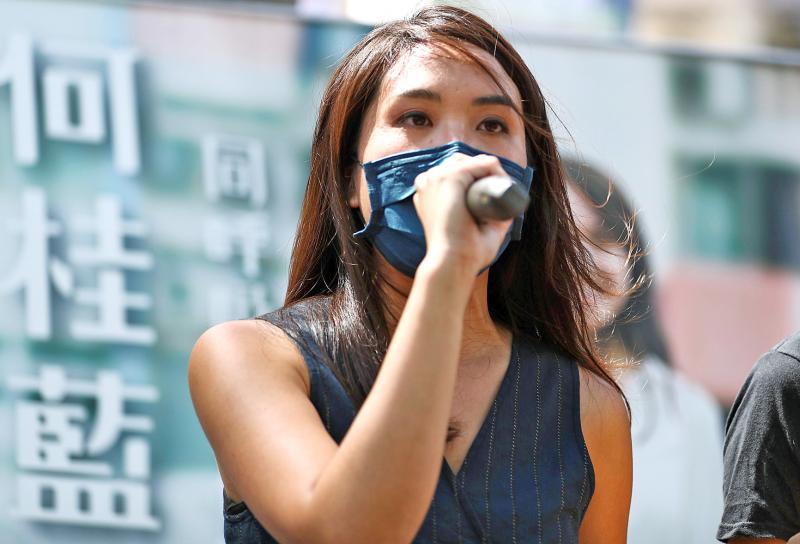Hong Kong’s largest national security case was yesterday sent to trial, after lingering 15 months in pretrial procedures during which most of the 47 defendants were denied bail.
Under the National Security Law, which Beijing imposed in 2020 following huge, sometimes violent democracy protests, the pro-democracy figures are charged with “conspiracy to subversion” for organizing an unofficial primary election.
Subversion is one of the four major crimes under the security law and can carry a punishment of up to life in prison.

Photo: AFP
The defendants, aged between 24 and 66, include democratically elected lawmakers and district councilors, as well as unionists, academics and others, whose political stances range from modest reformists to radical localists.
The case was first brought to court in March last year, when most of the 47 were denied bail after a four-day marathon hearing before a judge handpicked by the government to try national security cases.
Most of the pretrial hearings over the past 15 months, though held in an open court, have been subject to reporting restrictions — with the court repeatedly refusing applications from defendants and journalists for them to be lifted.
Family members and legal representatives have told reporters that the opaqueness has made the defendants “frustrated and depleted,” and allowed the prosecution to “move the goalposts.”
After a three-and-half-day hearing that began on Wednesday and Thursday last week and finished yesterday, all but one of the 47 defendants were committed to a senior court by Principal Magistrate Peter Law Tak-chuen (羅德泉), one of the national security judges.
Law on Wednesday last week announced that 17 defendants had been committed for trial. They included veteran activists “Long Hair” Leung Kwok-hung (梁國雄), barrister Lawrence Lau (劉偉聰) and journalist-turned-activist Gwyneth Ho (何桂藍).
Twenty-nine others — including law professor Benny Tai (戴耀廷), who was also one of the leaders of the “Occupy Central” movement in 2014 — were committed on Monday and yesterday.
Defendants who submit a non-guilty plea are committed for trial, while those who plead guilty are committed for sentencing, according to the Magistrates Ordinance.
The one outstanding defendant is to join the cohort later after further proceedings before the magistrate.
Hong Kong faces scrutiny over whether its legal system can maintain its independence as China cracks down on dissent with the security law.
More than 180 people have been arrested over the past two years since the security law came into force — the bulk of them activists, unionists and journalists — and 115 have been prosecuted.
Three men have been convicted and sentenced to jail for 43 months to nine years. One of them sought to appeal his 69-month sentence yesterday, with the court reserving judgement until early September.
The 47 defendants form the largest group in one single case under the law.
Authorities say the security law has successfully returned stability to the territory, but critics say it has eviscerated civil liberties and the political plurality the territory used to enjoy.

The CIA has a message for Chinese government officials worried about their place in Chinese President Xi Jinping’s (習近平) government: Come work with us. The agency released two Mandarin-language videos on social media on Thursday inviting disgruntled officials to contact the CIA. The recruitment videos posted on YouTube and X racked up more than 5 million views combined in their first day. The outreach comes as CIA Director John Ratcliffe has vowed to boost the agency’s use of intelligence from human sources and its focus on China, which has recently targeted US officials with its own espionage operations. The videos are “aimed at

STEADFAST FRIEND: The bills encourage increased Taiwan-US engagement and address China’s distortion of UN Resolution 2758 to isolate Taiwan internationally The Presidential Office yesterday thanked the US House of Representatives for unanimously passing two Taiwan-related bills highlighting its solid support for Taiwan’s democracy and global participation, and for deepening bilateral relations. One of the bills, the Taiwan Assurance Implementation Act, requires the US Department of State to periodically review its guidelines for engagement with Taiwan, and report to the US Congress on the guidelines and plans to lift self-imposed limitations on US-Taiwan engagement. The other bill is the Taiwan International Solidarity Act, which clarifies that UN Resolution 2758 does not address the issue of the representation of Taiwan or its people in

US Indo-Pacific Commander Admiral Samuel Paparo on Friday expressed concern over the rate at which China is diversifying its military exercises, the Financial Times (FT) reported on Saturday. “The rates of change on the depth and breadth of their exercises is the one non-linear effect that I’ve seen in the last year that wakes me up at night or keeps me up at night,” Paparo was quoted by FT as saying while attending the annual Sedona Forum at the McCain Institute in Arizona. Paparo also expressed concern over the speed with which China was expanding its military. While the US

SHIFT: Taiwan’s better-than-expected first-quarter GDP and signs of weakness in the US have driven global capital back to emerging markets, the central bank head said The central bank yesterday blamed market speculation for the steep rise in the local currency, and urged exporters and financial institutions to stay calm and stop panic sell-offs to avoid hurting their own profitability. The nation’s top monetary policymaker said that it would step in, if necessary, to maintain order and stability in the foreign exchange market. The remarks came as the NT dollar yesterday closed up NT$0.919 to NT$30.145 against the US dollar in Taipei trading, after rising as high as NT$29.59 in intraday trading. The local currency has surged 5.85 percent against the greenback over the past two sessions, central